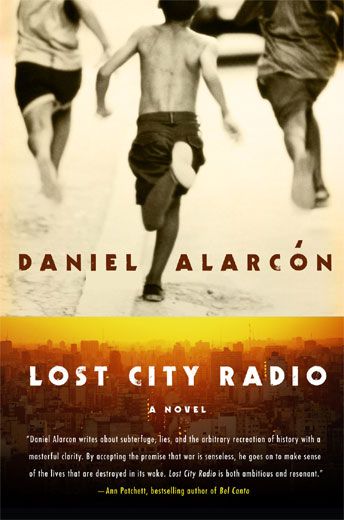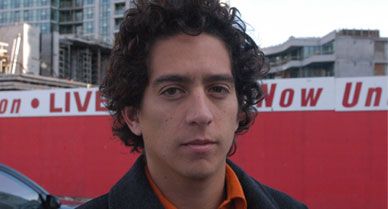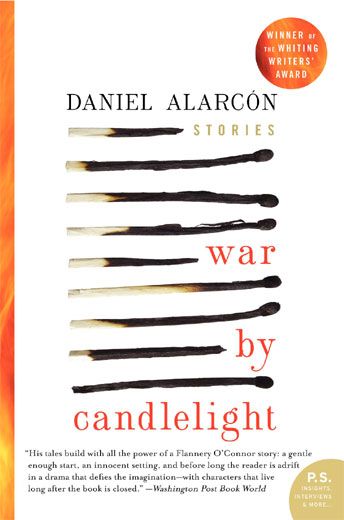Crossing the Divide
Novelist Daniel Alarcón’s writings evoke the gritty, compelling landscape of urban Latin America
He is slight, somewhat shy, a little tousled, with the look of a boy who has just come running off the soccer field. There is no grandiosity, no bespectacled elegance, none of the glamour or strut we tend to associate with Latin American writers. Yet in only four years, Daniel Alarcón has established himself as a new presence in American letters. Born in Peru—the country that gave us the fierce verse of César Vallejo and the richly imagined novels of Mario Vargas Llosa—he was raised in the suburbs of Birmingham, Alabama. When the New Yorker published his story "City of Clowns" in 2003, he was 26 years old.
Alarcón inhabits a bridge between the Americas, a place whose denizens are not entirely of one continent or the other. His fiction evokes the dust and grit of urban Peru, conveyed in gracefully nuanced English. He is, as he describes himself, "un norteamerincaico"—a North Amer-Incan—citizen of a highly mutable, interconnected world.
Alarcón came to Alabama as a toddler, when his parents—Peruvians who had attended medical school in the United States—decided they wanted to give their children a Yanqui education. Early on, he began delving into his older sister's books. By age 10, he had read Milan Kundera. At 11, he was memorizing Shakespeare. At 12, he had moved on to Vargas Llosa. At 16, when he was selected for a Telluride Association Summer Program, then located in Annapolis, Maryland, he proceeded to read 40 books in 40 days.
After graduating from Columbia University in 1999, he attended the Iowa Writers' Workshop, where he won the attention of novelists Frank Conroy and Ethan Canin, and, in time, was encouraged to write about Peru. But it was a country he knew only from a great distance. When, in 2001, he won a Fulbright scholarship to pursue an anthropological study of one of Lima's poorest districts, he took the opportunity to learn how the majority of his former countrymen live.
Alarcón made his way to San Juan de Lurigancho, a sprawling slum on the parched hills of Lima—a product of Peru's decade of terror in the 1980s, when hundreds of thousands of refugees, fugitives from the mountains and jungles, flooded into the capital, fleeing a bloody civil war. When Alarcón arrived 20 years later, Lurigancho held a burgeoning population of increasingly marginalized children. He rented a $15-a-month room and began teaching teenagers whose future held little promise beyond the grim world of those hills. That scant year's experience proved a rich source of inspiration for his fiction.
His first book, War by Candlelight, is a collection of stories about populations in flux—immigrants who come to feel they belong nowhere, drifters on the verge of losing their grip on reality. An art student from a well-off family suddenly decides that terrorism offers the only solution to poverty and injustice. A journalist who wanders off to report on a band of clown-beggars slips into a kind of inner-city delirium. The London Guardian called the book "a luminous beginning, crackling with attitude." Novelist Edward P. Jones noted that "Daniel Alarcón's stories are one of the reasons we go to storytellers—they present worlds we have only imagined or heard about in less truthful and poetic ways."
Alarcón's talent has been confirmed in a steady stream of stories and articles published in the New Yorker, Harper's and Virginia Quarterly Review, as well as in the distinguished Peruvian literary magazine, Etiqueta Negra, where he is associate editor. But earlier this year, when Alarcón published his first novel, Lost City Radio, he secured a place among the most promising writers of his generation.
Just as Alarcón's real-life experiences in Lurigancho inspired the stories in War by Candlelight, hard reality informs the plot of Lost City Radio. During a trip to Lima eight years ago, Alarcón began researching the disappearance of his uncle Javier, a leftist professor and rebel sympathizer who vanished into the jungle during the 1980s, when the civil war was at its most brutal. Traveling about Peru, interviewing anyone who might be able to shed light on that period of his uncle's life, Alarcón became an avid listener of a radio program called "Buscapersonas" ("People Finder"). Over time, Lost City Radio began to take shape in his imagination.
The novel centers on one character, Norma, the host of a popular radio program in the capital of a nameless South American country. The show's purpose is to locate the disappeared after a ten-year-long guerrilla war. Every Sunday, Norma broadcasts some of the names of the hundreds of thousands who are missing, hoping to reunite survivors with their families, or at least honor the memories of the dead. When a young boy appears at the radio station with a list of people who vanished from his jungle village, Norma suspects that her own husband, a dewy-eyed radical who had gone missing ten years before, was among them. The story Alarcón tells here is clearly of Peru, but could easily be of Mumbai or Baghdad, Karachi or Mexico City. In the Washington Post, Jonathan Yardley called Lost City Radio "a fable for an entire continent...no less pertinent in other parts of the world." Irish novelist Colm Toibin praised it as "gripping and tense...with echoes of Orwell and Huxley, and with images of astonishing originality."
The world of Alarcón's fiction is raw, harsh, filled with calamity and dislocation. But for all its broken dreams, it is a world where humanity reigns. From great suffering—from war, chaos and mass migration—he seems to be telling us, comes a new order, an unanticipated fusion. Not all of it bad. And some of it filled with a rare beauty.
He has been asked why a middle-class kid from Birmingham—a graduate of Columbia, a resident writer at Mills College in Oakland, California, whose parents keep an apartment in an exclusive area of Lima—chooses to set most of his stories in the ragged margins of Peruvian society. He responds that hardscrabble Peru is his territory precisely because he needs "to understand it, participate in its progress, and because I have friends there whose welfare concerns me." It is the response of a writer who understands something very important about the future: politics will never again be local. The globe is interconnected now. The world of Daniel Alarcón's characters is at your door.
Marie Arana, editor of the Washington Post's Book World, is the author of the novel Cellophane, set in the Amazon rain forest.


